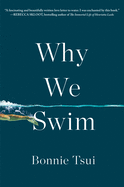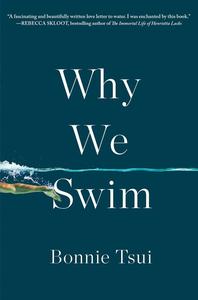
 Journalist Bonnie Tsui (American Chinatown) submerges her personal story of how and why she's come to be intrigued with all facets of human aquatic experience in a larger investigation into the historical evolution of swimming.
Journalist Bonnie Tsui (American Chinatown) submerges her personal story of how and why she's come to be intrigued with all facets of human aquatic experience in a larger investigation into the historical evolution of swimming.
Tsui's parents met at a swimming pool in Hong Kong. Tsui learned to swim at the age of five and, growing up, spent many hours in the surf at Jones Beach, a heavily frequented summer destination on Long Island. Tsui credits the recreational practice of swimming for keeping her afloat through her parents' divorce, college, knee surgery and miscarriage. Swimming has also tested Tsui's physical stamina in her San Francisco Bay swim to Alcatraz; her swim to an Italian monastery (and back); and the sublime experience of swimming across a lake at her wedding. Now, three decades later, she's an adult and mother of two young children, swimmers themselves. Tsui continues to swim in pursuit of peace, pleasure and exercise, while also on a quest to understand the many reasons why humans, who are not natural-born swimmers and must be taught, have always been drawn to water.
The research and analysis Tsui presents is thoroughly engaging: "Swimming can enable survival in ways beyond the physical.... We come closer to the acutely vivid experience of life itself. We evolve. Why we swim does, too." Since prehistoric times, human ancestors have led a "hunter-gatherer existence, pool-hopping as needed but mostly staying put by the water" for survival. There's evidence that Neanderthals lived off the sea 28,000 years ago. And 10,000 years ago, Homo sapiens first learned how to swim, as is recorded in images of the breaststroke painted on the walls of a cave in Egypt, near the Libyan border.
From this foundation, Tsui dives deeper into eclectic stories about collective and individual swimming experiences, including Olympic athlete Michael Phelps, who mentally calms his symptoms of ADHD through conditioning rituals and competitive swimming trials. The most fascinating case studies in the book, however, center on incredible plights. Guðlaugur Friðþórsson, an Icelandic fisherman, was forced to swim for his survival for six hours in dangerously frigid ocean waters when his vessel went down in the 1980s. Kim Chambers of New Zealand took up swimming following a freak accident--a fall--that left her seriously disabled. Water therapy helped her conquer innumerable challenges and led her to become a long-distance open-water swimmer, ultimately triumphing in the formidable Oceans Seven Marathon.
In presenting each story, Tsui shares what the water and swimming means to each individual, while also tying in inspiring insights. Tsui is a poetic writer whose flowing, immersive prose and colorful storytelling will hold significant appeal for readers--especially swimmers--of all curiosities. --Kathleen Gerard, blogger at Reading Between the Lines.
Shelf Talker: A journalist shares her personal passion for swimming as sport, survival and mental sustenance, setting it in the larger context of aquatic history.

